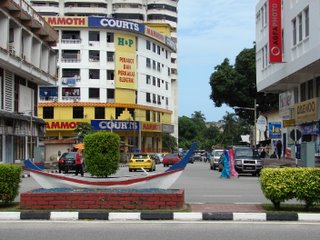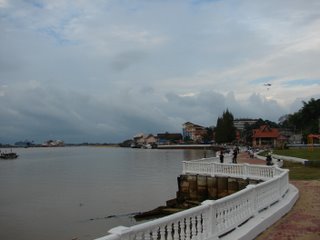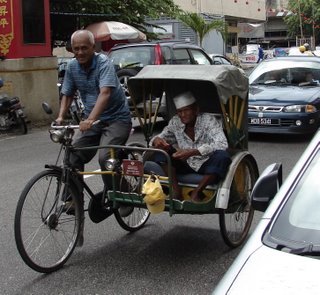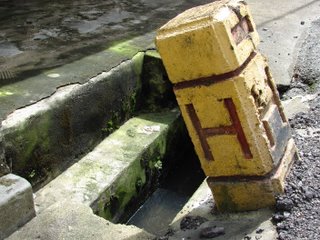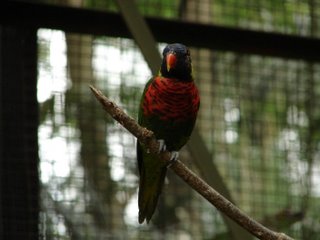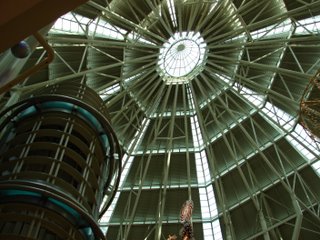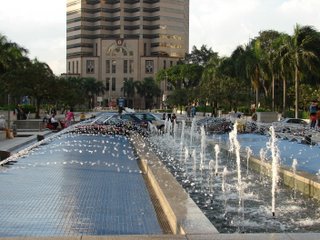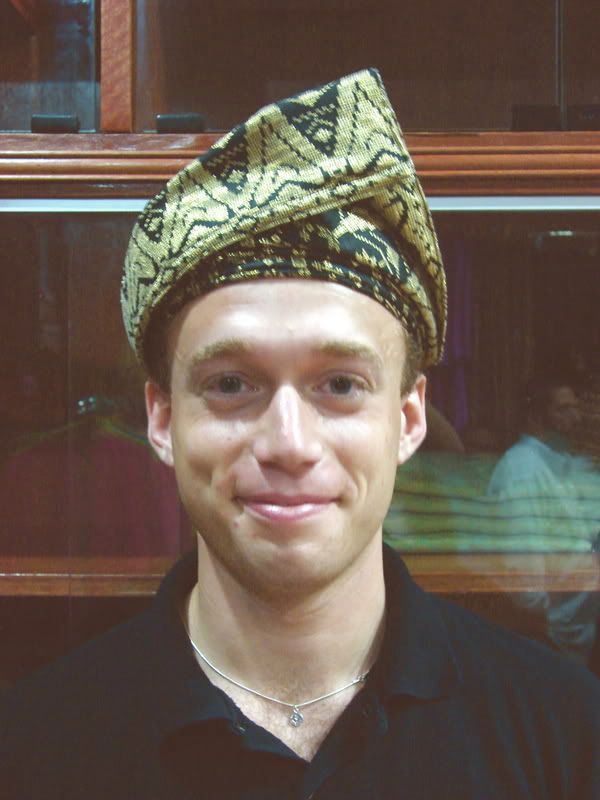Merry Christmas
 Christmas was different this year. There was no Santa, no cookies, no TV specials, and most notably, no family. Instead, the other English teachers and I went down to Chinatown and made ourselves a Christmas that will certainly be worth remembering. We went to a small café not too far from our hotel and they apparently knew we were coming. Balloons were strung from the rafters and trees and three large platters of food were waiting for us. To wash down the fried noodles, chicken wings, and dim sum we were given pints of beer which made the thin Santa hats lying on our table look completely appropriate for the occasion. A Chinese choir came out of nowhere and even though we didn’t understand the words, we understood the tune and sang right along with them. After they finished, they lined up to give each of us a handshake, a more than genuine smile, and a “Merry Christmas.” The owners set up a karaoke machine and even though their selection of English language music was a bit limited, we all grabbed the microphone and sang like we were at home. This was my first Christmas away from home, and as strange as it is to not have a stocking or presents, it was enjoyable nonetheless.
Christmas was different this year. There was no Santa, no cookies, no TV specials, and most notably, no family. Instead, the other English teachers and I went down to Chinatown and made ourselves a Christmas that will certainly be worth remembering. We went to a small café not too far from our hotel and they apparently knew we were coming. Balloons were strung from the rafters and trees and three large platters of food were waiting for us. To wash down the fried noodles, chicken wings, and dim sum we were given pints of beer which made the thin Santa hats lying on our table look completely appropriate for the occasion. A Chinese choir came out of nowhere and even though we didn’t understand the words, we understood the tune and sang right along with them. After they finished, they lined up to give each of us a handshake, a more than genuine smile, and a “Merry Christmas.” The owners set up a karaoke machine and even though their selection of English language music was a bit limited, we all grabbed the microphone and sang like we were at home. This was my first Christmas away from home, and as strange as it is to not have a stocking or presents, it was enjoyable nonetheless.On the other hand, adjusting to life as an outsider is not always a party. I get stared at everywhere I go. Men, women,
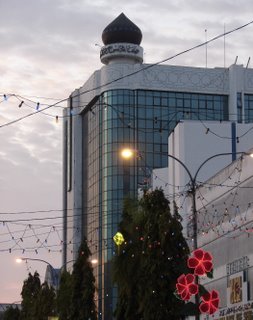 and children alike act as if they have never seen a white person before. And in some cases, it’s true. Westerners are not at all common in these parts, and apparently, especially those who are blond and blue-eyed. What’s more disturbing isn’t necessarily the attention to which I’m not exactly accustomed, but the fact that every car that goes by is filled with people craning their necks to catch a glimpse of a table full of Americans makes me feel like an attraction rather than a person. Some are bold enough to come up, introduce themselves, and start practicing their English, which more often than not is in need of some practice. This happens at least once a day, and instinctively, I feel that they must be talking to me because they want something or they’re trying to sell me a cell phone. But here, it’s just not like that. They seem to be, in fact, simply curious.
and children alike act as if they have never seen a white person before. And in some cases, it’s true. Westerners are not at all common in these parts, and apparently, especially those who are blond and blue-eyed. What’s more disturbing isn’t necessarily the attention to which I’m not exactly accustomed, but the fact that every car that goes by is filled with people craning their necks to catch a glimpse of a table full of Americans makes me feel like an attraction rather than a person. Some are bold enough to come up, introduce themselves, and start practicing their English, which more often than not is in need of some practice. This happens at least once a day, and instinctively, I feel that they must be talking to me because they want something or they’re trying to sell me a cell phone. But here, it’s just not like that. They seem to be, in fact, simply curious.I recently found out that I will be stationed in a school in the district of Kemaman about one hundred miles south of Kuala
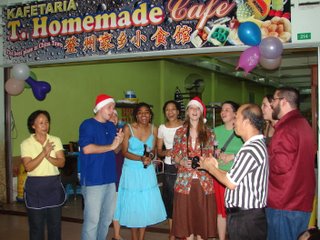 Terengganu where I have been living for the past three weeks. To put things in perspective, Terengganu is a state roughly about the size of Georgia, Kemaman is a district about the size of a County, and Kuala Terengganu is about the size of New London, CT. There, I will be assisting in the teaching of English and (I hope) math, science, and a sport of some kind. When I signed up for this post, I was told that we are expected to become a part of the community, not just another teacher and after waiting for what feels like a lifetime, I’m more than ready to start. I hope that
Terengganu where I have been living for the past three weeks. To put things in perspective, Terengganu is a state roughly about the size of Georgia, Kemaman is a district about the size of a County, and Kuala Terengganu is about the size of New London, CT. There, I will be assisting in the teaching of English and (I hope) math, science, and a sport of some kind. When I signed up for this post, I was told that we are expected to become a part of the community, not just another teacher and after waiting for what feels like a lifetime, I’m more than ready to start. I hope that  if I’m posted to a community small enough I will be able to make people stop staring at me because I’m different and instead smile at me because they know that I’m there to help and learn. I get the feeling that most people look at me as a traveler or a tourist and once I’m able to actually able to communicate with them, in whatever language, they’ll realize that I’m pretty much the same as they are, just with different skin.
if I’m posted to a community small enough I will be able to make people stop staring at me because I’m different and instead smile at me because they know that I’m there to help and learn. I get the feeling that most people look at me as a traveler or a tourist and once I’m able to actually able to communicate with them, in whatever language, they’ll realize that I’m pretty much the same as they are, just with different skin. The best time that I’ve had in this country so far happened just two days ago. I was in the market looking for Christmas presents when I saw a couple of children playing ping-pong on a rough table with a plank for a net. I used to play quite a bit when I was in high school and college, so I decided to ask one of the boys if I could join. The kids, both looking around fifteen or so, looked at each other smiled. I don’t know if they understood English, but they understood that I wanted to play. One handed me his paddle and the other said, “OK”. We worked out the score in broken English and hand gestures and played a fierce game of ping pong, if such a thing exists. He beat me 18-21, but at
The best time that I’ve had in this country so far happened just two days ago. I was in the market looking for Christmas presents when I saw a couple of children playing ping-pong on a rough table with a plank for a net. I used to play quite a bit when I was in high school and college, so I decided to ask one of the boys if I could join. The kids, both looking around fifteen or so, looked at each other smiled. I don’t know if they understood English, but they understood that I wanted to play. One handed me his paddle and the other said, “OK”. We worked out the score in broken English and hand gestures and played a fierce game of ping pong, if such a thing exists. He beat me 18-21, but at  least he didn’t crush me mercilessly. A small crowd had gathered, maybe twenty people or so, and a young man maybe in his thirties stepped up to table and raised a paddle. We played and he won, but I still managed to squeak out an admirable score. The whole affair had become quite a spectacle and gathered a large enough crowd so that the third and final game actually had an audience that cheered now and then when someone scored. Everyone seemed to have a good time and whenever I go back to the market, I recognize faces and they recognize mine with a familiar nod. If I could make a daily habit out of something like that, I will be a rich man. Oh, and I lost the third game too, but at 19-21, I should have had him.
least he didn’t crush me mercilessly. A small crowd had gathered, maybe twenty people or so, and a young man maybe in his thirties stepped up to table and raised a paddle. We played and he won, but I still managed to squeak out an admirable score. The whole affair had become quite a spectacle and gathered a large enough crowd so that the third and final game actually had an audience that cheered now and then when someone scored. Everyone seemed to have a good time and whenever I go back to the market, I recognize faces and they recognize mine with a familiar nod. If I could make a daily habit out of something like that, I will be a rich man. Oh, and I lost the third game too, but at 19-21, I should have had him.

